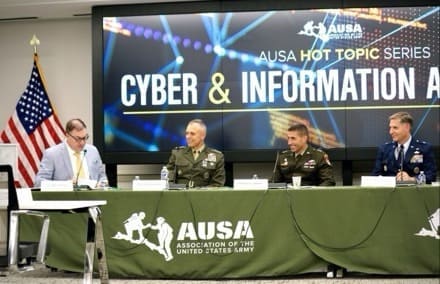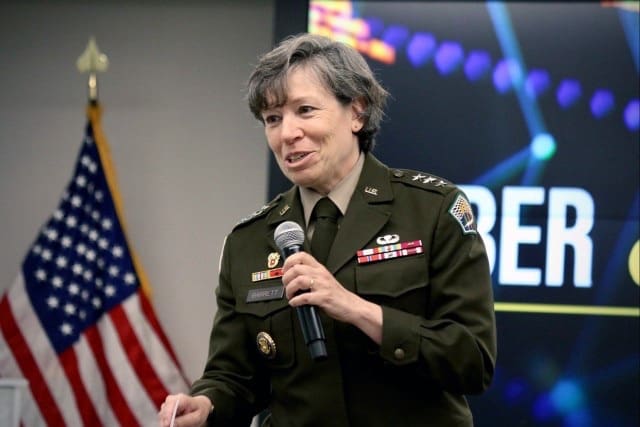
ARLINGTON, Va. — Military and civilian leaders from across the Army Cyber enterprise joined their expert partners from military, industry, academic, government and media organizations to discuss the ever-evolving cyber landscape and how military forces can develop and employ information advantage in cyberspace, at the Association of the United States Army’s “Hot Topic: Cyber and Information Advantage” event in Arlington, July 2, 2024.
Lt. Gen. Maria Barrett, commanding general of U.S. Army Cyber Command led the day of panel discussions and remarks that was co-hosted by ARCYBER and the Army Combined Arms Center.
“This is all for the purpose of enabling commanders to visualize, decide and synchronize the effects that they could have within the (cyber) dimension,” said Barrett during her opening remarks.
She emphasized that to succeed in that dimension requires looking at every phase of the continuum of conflict. “If you think you’re going to deliver insights to a commander about the information dimension, and you’re not looking at it in the competition phase, whatever you are delivering in crisis, in conflict, probably will fall short,” she said.

Among the other senior Army Cyber leaders participating in the daylong event were Maj. Gen. Paul Stanton, commanding general of the U.S. Army Cyber Center of Excellence and Fort Eisenhower, and Lydia Snider, advisor on foreign malign influence to the ARCYBER commanding general.
Snider provided insights during a panel on the effects of social media on information advantage activities, highlighting its prevalence and growing impact on global affairs. Social media has removed borders, she said, allowing our adversaries to get into the hearts and minds of Americans. To combat their efforts, we must ask the right questions about their intentions and increase messaging about democratic ideals and values.
With information proving to be a critical instrument in influencing global affairs, the Army and its Department of Defense, allied, industry, government and other partners are focused on ensuring we are positioning ourselves to combat our adversaries on all fronts. During the last panel of the day and a media roundtable following the event, Stanton talked about how thorough planning with specific objectives is vital to getting commanders’ support for cyber operations, and the standup of three theater information advantage detachments, or TIADs, to provide broad expertise in that planning.

“We, in the Army, are promoting the theatre information advantage detachment,” said Stanton. “That is the element that is going to do the planning across our ability to influence, inform, protect, attack and support decision making that will drive tangible and measurable outcomes.”
“The TIAD has to do all detailed planning, they have to do the data collection, they have to get the approvals in order to execute mission, and then they have to do the appropriate assessment of effectiveness after the fact,” Stanton said.
Col. Bryan Babich, director of the Army Mission Command Center of Excellence, said that as with as with other cyber operations, the success of the TIADs will depend on preparation, initiative and relationship building between the Army and its partners.
“You can’t wait until crisis or conflict to start,” said Babich at the roundtable. “That is why it is so important with the TIADs and how they are forward posturing and working with partners.”
By SSG Kyle Alvarez

